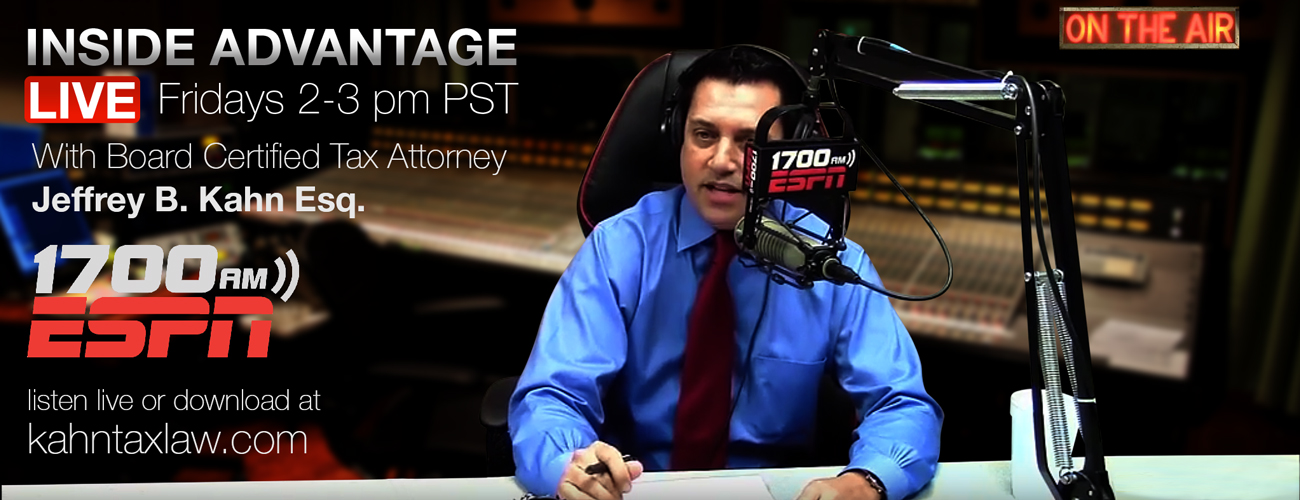Jeffrey B. Kahn, Esq. and Windus A. Fernandez Brinkkord Discusses Oil Price Impact On Saudi Arabia, Newest IRS Scam and Taxes On ESPN Radio Podcast
Jeffrey B. Kahn, Esq. and Windus A. Fernandez Brinkkord Discusses Oil Price Impact On Saudi Arabia, Newest IRS Scam and Taxes On ESPN Radio – June 3, 2016 Show
Topics Covered:
- Meet Our Guest Of The Day: Ed Quinlan, Market President of Corporate Alliance.
- Oil Change: Affluent Saudi Arabia Goes to Work
- IRS Warns of Latest Scam Variation Involving Bogus “Federal Student Tax”
- Questions from our listeners:
a. My spouse passed away last year, and I will be filing a joint return. How should I file, how should I sign, and are there any special notations required to indicate my spouse is deceased?
b. How do I sign my tax return when I e-file?
****************************************************************************
Jeff states: Good afternoon! Yes sometimes we just have to take the money and run!
Welcome to Inside Advantage – Your Financial And Tax Radio Show.
This is Board Certified Tax Attorney, Jeffrey B. Kahn, the principal attorney of the Law Offices Of Jeffrey B. Kahn, P.C. and head of the KahnTaxLaw team.
Windus states:
And this is Licensed Financial Planner, Windus A. Fernandez Brinkkord, Senior Vice President Of Investments at Trilogy Financial Services.
You are listening to our weekly radio show where we talk everything about finances and taxes from the ESPN 1700 AM Studio in San Diego, California.
Jeff states:
When it comes to knowing tax laws and paying taxes, let’s face it — everyone in the U.S. is either in tax trouble, on their way to tax trouble, or trying to avoid tax trouble!
Windus states:
And whether you are on the rebound or flying high, we have the information you need to make sound financial decisions and map out your strategy for success.
Jeff states:
Our show is broadcasted each Friday at 2:00PM Pacific Time and replays are available on demand by logging into the KahnTaxLaw website at www.kahntaxlaw.com.
Jeff states:
For today’s show we have coming up:
Segment 2 material: Oil Change: Affluent Saudi Arabia Goes to Work.
Windus states:
Also coming up is:
Segment 3 material: IRS Warns of Latest Scam Variation Involving Bogus “Federal Student Tax”.
And of course towards the end of our show, we will be answering some of your questions.
Jeff starts chit chat with Windus.
Windus states: Let’s introduce you to today’s guest:
Ed Quinlan, Market President of Corporate Alliance. Email: eq@corporatealliance.net
Questions:
a. Describe your primary everyday responsibilities as a Market President.
b. What type of background do you look for in a prospect you’re looking to recruit?
c. Would you consider “communication disconnect” the number one deficiency that corporations face?
d. What would your plan of attack be, going in to consult for a business that is lacking highly productive individuals?
e. What are some good examples of creating continuous learning environments for associates?
f. What do you find is the most difficult aspect of customer retention?
Jeff states: Well it’s time for a break but stay tuned because we are going to tell you about how the oil change is making affluent Saudi Arabia go to work.
You are listening to Board Certified Tax Attorney, Jeffrey B. Kahn, and Licensed Financial Planner, Windus A. Fernandez Brinkkord on Inside Advantage on ESPN.
BREAK
Welcome back. This is Inside Advantage – Your Financial And Tax Radio Show on ESPN and you are listening to Board Certified Tax Attorney, Jeffrey B. Kahn, and Licensed Financial Planner, Windus A. Fernandez Brinkkord.
And be aware of the special offer that Windus has for you: Windus PLUG: Trilogy Financial Services will provide you with a retirement cash flow analysis which is a $600.00 value for free as long as you mention the Inside Advantage Radio Show when you call to make an appointment. Call my office to make an appointment to meet with me, Windus A. Fernandez Brinkkord. The number to call is 858.314.5169. That is 858.314.5169. Or visit www.guideyourstory.com.
Oil Change: Affluent Saudi Arabia Goes to Work
http://www.wsj.com/articles/oil-change-affluent-saudi-arabia-goes-to-work-1464716895;
http://www.bloomberg.com/news/articles/2016-06-01/saudis-said-to-seek-restoration-of-opec-unity-after-doha-failure-iowrk295
1. Saudi Arabia’s leadership has taken up the challenge of weaning the kingdom from its dependence on oil
a. Deputy crown prince’s urgent plan to wean kingdom from petroleum will mean deep changes in a conservative society long accustomed to handouts
2. Dismantling the world’s biggest petro-state
a. a key part of the government’s economic strategy is to replace foreign workers with Saudis displaced from down-sizing oil conglomerates
3. Prince Mohammed bin Salman
a. Deputy crown prince, second in line to the throne
b. Runs all economic and domestic policy
c. Runs the country’s military
d. Launched a historic effort to remake the conservative, change-averse kingdom
4. History of a developed kingdom
a. Crude was first discovered there in 1938
b. Developed into one of the quintessential economic constructs of the oil age
c. Billions of barrels of crude oil, pumped and sold to the world, have forged its politics and economy
5. Saudi citizens benefit from oil
a. Citizens have enjoy deeply discounted gasoline, water and electricity
b. Subsidized housing
c. Health care and education(including stints studying abroad) are paid for by the government
d. No taxes
e. Businesses have depended on cheap energy and ready access to cheap foreign labor
6. Demographics are overwhelming the petrostate
a. Social compact is breaking down
b. Declining oil prices
c. By 2030, the number of Saudis over the age of 15 will likely increase by about six million
i. At least 4.5 million new eligible workers into the labor force
ii. Even more if women begin working in larger numbers
iii. Doubling the size of the adult population
d. Stretching the kingdom’s cradle-to-grave system of handouts and subsidies to the breaking point
i. Requires the creation of almost three times as many jobs as the country generated
e. Sales, repair and low-level management jobs have long been filled by foreign workers
i. Inexpensive
ii. Willing to work long hours
7. The Response
a. Government envisions a broad diversification of the economy beyond crude exports
b. Privatize chunks of many government companies
c. Expanding more aggressively into higher-value refined products such as gasoline and petrochemicals
d. Developing a tourist industry
e. Building a manufacturing base
8. Develop tourism
a. An industry the government has struggled with
b. Holy city of Mecca draws tens of millions of visitors annually during the hajj pilgrimage
i. Saudi construction companies have made fortunes building new luxury hotels and shopping malls
ii. Muslim holy cities remain off limits to non-Muslims
c. The kingdom still doesn’t issue tourist visas, but the government says it plans to start a tourist visa program soon
d. Some tourism boosters would like to turn the country into a year-round destination
i. Capitalizing on archeological treasures
ii. Scuba diving
iii. A variety of government-supported efforts to restore historic homes
1. New projects teach restoration
2. Carpentry skills
9. Biggest challenge for the kingdom’s overhaul of the petrostate
a. The flood of oil dollars tends to drive up the price for Saudi labor
b. Exports too costly to compete in foreign markets
c. “about wealth creation” for business owners, not “economic value creation”
i. Neither encourage innovation
10. Ministry of Labor and Social Development
a. The ministry has launched a nationwide media campaign to complete “Saudization” by September
b. Decided to replace all foreigners who work in shops for sales and maintenance of mobile phones with Saudi nationals
c. New ban on foreign workers will create more than 20,000 job opportunities for locals
d. 19,084 men and women have been trained and are ready to take jobs in the sales, customer service and basic maintenance of mobile phones
e. Force most retail outlets to close by 9 p.m. instead of 11 p.m. or midnight, to make retail jobs more attractive to Saudis because it will allow them to finish work early enough to return home to spend time with their families
11. Segments of Saudi society are expressing unease
a. Skeptical that the government will be able to train enough people in time to make the plan work within the deadline
b. The sector has been controlled by foreigners for many years
c. Limits on store hours are impractical
i. Forced to close five times a day for prayer
ii. Temperatures are often blazing hot during the day
iii. Most people prefer to shop and run errands in the evening
d. Government goal = bring more Saudi women into the workforce
e. Kingdom’s arch-conservative clerical class aggravated over the government’s efforts to expand women’s participation in the public workplace
f. Young Saudis have over the years acquired a reputation of looking down on manual work
12. Innovation Center at King Fahd University for Petroleum and Minerals
a. The center has forged tie-ups with multinational companies
i. General Electric Co.
1. Invest at least $1.4 billion
2. Double its workforce in the kingdom to 4,000 by 2020
3. onglomerate plans to team up with two partners, including Aramco, to build a $400 million manufacturing facility for the energy and marine sector
ii. China’s Sinopec
b. Has developed dozens of new patents
c. 90 new products, including a water purification process
d. The university’s business incubator is developing case studies in Arabic
i. tap into the youngest members of some of the kingdom’s prominent merchant families
Windus PLUG: Trilogy Financial Services will provide you with a retirement cash flow analysis which is a $600.00 value for free as long as you mention the Inside Advantage Radio Show when you call to make an appointment. Call my office to make an appointment to meet with me, Windus A. Fernandez Brinkkord. The number to call is 858.314.5169. That is 858.314.5169. Or visit www.guideyourstory.com.
Stay tuned because we do not want you to be a victim to the newest IRS scam variation involving a bogus “Federal Student Tax”.
You are listening to Board Certified Tax Attorney, Jeffrey B. Kahn, and Licensed Financial Planner, Windus A. Fernandez Brinkkord on Inside Advantage on ESPN.
BREAK
Jeff states: Welcome back. This is Inside Advantage – Your Financial And Tax Radio Show on ESPN and you are listening to Board Certified Tax Attorney, Jeffrey B. Kahn, and Licensed Financial Planner, Windus A. Fernandez Brinkkord.
Calling into the studio from my Walnut Creek Office is my associate attorney, Amy Spivey.
Chit chat with Amy
And be aware of the special Offer that I have for you: PLUG: The Law Offices Of Jeffrey B. Kahn, P.C. will provide you with a Tax Resolution Plan which is a $500.00 value for free as long as you mention the Inside Advantage Radio Show when you call to make an appointment. Call my office to make an appointment to meet with me, Jeffrey Kahn, right here in downtown San Diego or at one of my other offices close to you. The number to call is 866.494.6829. That is 866.494.6829.
IRS Warns of Latest Scam Variation Involving Bogus “Federal Student Tax”
Windus states: Scam artists exploiting innocent law-abiding taxpayers has been a big problem for the IRS and despite issuing multiple consumer alerts, the bogus emails, the bogus IRS letters and the bogus telephone calls continue and unfortunately taxpayers are still falling for this.
Jeff states: Every week our office receives about a half-dozen inquiries from taxpayers asking whether the communication they just received is really from the IRS. Scam artists have been coming up with new creative ways to lure victims. I do not want you to become the next victim of any such scam so listen carefully to what we have to say.
Amy states: In the latest scheme taxpayers are receiving bogus phone calls from IRS impersonators demanding payment for a non-existent tax, the “Federal Student Tax.” The scammers look to target students and try to convince them to wire money immediately to the scammer. If the victim does not fall quickly enough for this fake “federal student tax”, the scammer threatens to report the student to the police.
Amy continues: Scam artists frequently masquerade as being from the IRS, a tax company and sometimes even a state revenue department. Many scammers use threats to intimidate and bully people into paying a tax bill. They may even threaten to arrest, deport or revoke the driver’s license of their victim if they don’t get the money.
Jeff states: Some examples of the varied tactics seen this year are:
• Demanding immediate tax payment for taxes owed on an iTunes gift card.
• Soliciting W-2 information from payroll and human resources professionals.
• “Verifying” tax return information over the phone.
• Pretending to be from the tax preparation industry.
Windus states: The communication methods used by the scammers are email, letters and telephone calls. The scammers are still going strong doing this to people who are unsuspecting and don’t know how systems work and could very easily frighten them to turn over money. So with my two top tax attorneys we are going to break down each type of fraudulent communication for you and give you the warning signs and tips that you should be aware of.
Windus asks: Amy please tell us what people should be aware about emails.
Amy states: When identity theft takes place over the Internet, it is called phishing. Phishing (as in “fishing for information” and “hooking” victims) is a scam where Internet fraudsters send e-mail messages to trick unsuspecting victims into revealing personal and financial information that can be used to steal the victims’ identity. Current scams include phony e-mails which claim to come from the IRS and which lure the victims into the scam by telling them that they are due a tax refund.
Jeff states: Remember, too, the IRS does not use unsolicited email, text messages or any social media to discuss your personal tax issue so if this is the form of communication used – avoid it like you would avoid the plague.
Windus asks: Amy please tell us what people should be aware about letters.
Amy states: If you receive a notice regarding your taxes which does not bear the official seal of the Internal Revenue Service and an official verifiable address of an IRS office or Service Center, that is a sign that it really isn’t the IRS sending you a notice.
Jeff states: Another scam that the public has told our office involves a sophisticated fraudulent tax collection notice scam targeting taxpayers for which the IRS has filed a Federal Tax Lien.
Jeff continues: Here is how it works: The scammers will search public records for the filing of a Federal Tax Lien by IRS and with the information gathered from that filing will generate a form letter and mail it to the targeted taxpayer. The letter is designed to mimic an IRS notice but it is really coming from a third party having nothing to do with the IRS. If the recipient of the notice contacts the number listed, the person answering your call will purport to be working for the IRS. The intended victim is told he or she owes money to the IRS and it must be paid promptly through a pre-loaded debit card or wire transfer. If the victim refuses to cooperate, he or she is then threatened with arrest, deportation or suspension of a business or driver’s license. In many cases, the person who answered your call becomes hostile and insulting.
Windus asks: Amy please tell us what people should be aware about the telephone.
Amy states: These callers may demand money or may say you have a refund due and try to trick you into sharing private information. These con artists can sound convincing when they call. Scammers use fake names and IRS badge numbers. They generally use common names and surnames to identify themselves. They may know a lot about you and may be able to recite the last four digits of a victim’s Social Security Number and your place of business. They usually alter the caller ID to make it look like the IRS is calling – many times they will use a Washington, D.C. area code. The area codes for the Washington D.C. area are 202, 301 and 703. They will also background noise of other calls being conducted to mimic a call site. If you don’t answer, they often leave an “urgent” callback request and if they have your email address, will send bogus IRS emails to some victims to support their bogus calls. After threatening victims with jail time or driver’s license revocation, scammers hang up and others soon call back pretending to be from the local police or DMV, and the caller ID supports their claim.
Windus asks: How do you recognize that this call is fake?
Amy states: Here are five things the scammers often do but the IRS will not do. Any one of these five things is a tell-tale sign of a scam. The IRS will never:
1. Call you about taxes you owe without first mailing you an official notice.
2. Demand that you pay taxes without giving you the opportunity to question or appeal the amount they say you owe.
3. Require you to use a specific payment method for your taxes, such as a prepaid debit card.
4. Ask for credit or debit card numbers over the phone.
5. Threaten to bring in local police or other law-enforcement groups to have you arrested for not paying.
Jeff states So what should you do?
Amy states: If you get a phone call from someone claiming to be from the IRS and asking for money, here’s what you should do:
If you know you don’t owe taxes or have no reason to believe that you do, report the incident to the Treasury Inspector General for Tax Administration at 1.800.366.4484.
Jeff states: And if you do owe taxes and you have not already resolved this with the IRS, then that is where we come in.
PLUG: The Law Offices Of Jeffrey B. Kahn, P.C. will provide you with a Tax Resolution Plan which is a $500.00 value for free as long as you mention the Inside Advantage Radio Show when you call to make an appointment. Call my office to make an appointment to meet with me, Jeffrey Kahn, right here in downtown San Diego or at one of my other offices close to you. The number to call is 866.494.6829. That is 866.494.6829.
Thanks Amy for calling into the show. Amy says Thanks for having me.
Stay tuned as we will be taking some of your questions. You are listening to Board Certified Tax Attorney, Jeffrey B. Kahn, and Licensed Financial Planner, Windus A. Fernandez Brinkkord on Inside Advantage on ESPN.
BREAK
Jeff states: Welcome back. This is Inside Advantage – Your Financial And Tax Radio Show on ESPN and you are listening to Board Certified Tax Attorney, Jeffrey B. Kahn, and Licensed Financial Planner, Windus A. Fernandez Brinkkord.
And Windus and I always pleased to make our offers to our listeners where… PLUG: The Law Offices Of Jeffrey B. Kahn, P.C. will provide you with a Tax Resolution Plan which is a $500.00 value for free as long as you mention the Inside Advantage Radio Show when you call to make an appointment. Call my office to make an appointment to meet with me, Jeffrey Kahn, right here in downtown San Diego or at one of my other offices close to you. The number to call is 866.494.6829. That is 866.494.6829.
Windus states: Windus PLUG: Trilogy Financial Services will provide you with a retirement cash flow analysis which is a $600.00 value for free as long as you mention the Inside Advantage Radio Show when you call to make an appointment. Call my office to make an appointment to meet with me, Windus A. Fernandez Brinkkord. The number to call is 858.314.5169. That is 858.314.5169. Or visit www.guideyourstory.com.
You should also know that the securities and advisory services are offered through National Planning Corporation (NPC) Member FINRA, SIPC, and a Registered Investment Advisor. Trilogy Financial Services and NPC are separate and unrelated Entities.
Jeff states: If you would like to post a question for us to answer, you can go to my website at www.kahntaxlaw.com and click on “Radio Show”. You can then enter your question and maybe it will be selected for our show.
OK Ed since you are today’s guest, we will let you pull this week’s questions for us to answer?
Sharon from Del Mar asks: My spouse passed away last year, and I will be filing a joint return. How should I file, how should I sign, and are there any special notations required to indicate my spouse is deceased?
Answer:
• Across the top of the return – above the area where you enter your address, write “Deceased,” your spouse’s name, and the date of death.
• When you are a surviving spouse filing a joint return and a personal representative has not been appointed, you should sign the return and write “filing as surviving spouse” in the signature area below your signature.
• A tax return for a decedent can also be filed electronically. Follow the specific directions provided by your preparation software for proper signature and notation requirements.
Note: You cannot file a final joint return with your deceased spouse if you as the surviving spouse remarried before the end of the year of death. The filing status of the decedent in this instance is married filing separately.
Cindy from San Diego asks: How do I sign my tax return when I e-file?
Answer:
You can sign your tax return electronically by using a Self-Select PIN, an Electronic Filing PIN, or a Practitioner PIN.
Self-Select PIN – Using the Self-Select PIN method, allows you to electronically sign your individual income tax return by selecting a five-digit personal identification number (PIN). The PIN can be any five numbers (except all zeros) that you choose to enter as your electronic signature PIN.
If you are filing a joint return, each spouse uses his or her own PIN. As part of the authentication process, each taxpayer also enters his or her date of birth and either his or her:
• Original prior year adjusted gross income (AGI)
• Prior year PIN, or
• Temporary PIN obtained using the Get Your Electronic Filing PIN Web tool
If you need to know the eligibility requirements or you cannot locate your prior year AGI or prior year PIN, see Self-Select PIN Method for Forms 1040 and 4868 Modernized e-File (MeF).
Electronic Filing PIN – The Electronic Filing PIN (EFP) is a temporary number issued by the IRS Web application. If you need an EFP, access the Get Your Electronic Filing PIN application or call 866-704-7388. You will have to follow the provided instructions in order to receive your PIN. As a reminder, this number changes every year.
Practitioner PIN – The Practitioner PIN is a method that does not require a prior AGI amount or prior year PIN. When using this method, you must always appropriately sign a completed signature authorization form such as the Form 8879, IRS e-file Signature Authorization. Under this method, you may either enter your own PIN into the return or authorize your Electronic Return Originator to select and enter your PIN. If you use the Practitioner PIN method and enter your own PIN in the electronic return record after reviewing the completed return, you must still appropriately sign the signature authorization form.
Jeff states: Well we are reaching the end of our show. Ed thank you for joining us.
Remember you can send us your questions by visiting the kahntaxlaw website at www.kahntaxlaw.com.
Windus states: Have a great day everyone!










 Follow
Follow Follow
Follow